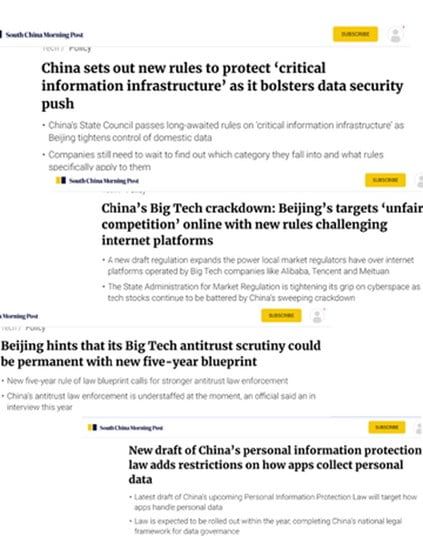China Tech Crackdown – Anti-monopoly Fines
【Posted on: 2021 August】
In recent weeks, China has been enacting several new laws to protect sensitive data, prevent misuse of personal information & reign in anti monopolistic behaviour. In this series of articles over the next several months, we will be looking into details of some of these areas to try to map out the impact of these decisions on marketing & advertising. Several of the laws are still in early stages, are vague and will require more time and details to get clarity.
TL;DR –
Government Actions
Central and local governments to “improve and enhance anti-monopoly law enforcement”
Protection of “critical Information Infrastructure”
Empower government agencies to target “unfair competition activities”
New updates to Personal Information Protection Law
Impact:
Collection of personal data, how is it shared and used and likely how the advertising community will use it.
More scrutiny of advertisers, advertisements so as not to fall foul of the law
Some good news, less restriction on cross-linkages between super apps like Tencent & Alibaba – currently cannot link to Tmall within WeChat, etc.

On the morning of July 24, the State Administration of Market Supervision (SAMR) issued an administrative penalty decision on the illegal implementation of monopoly by Tencent in acquiring equity of China Music Group and ordered Tencent and its affiliates to remove exclusive copyrights and stop high amounts. In addition, Tencent is required to report to SAMR on the performance of its obligations every year for three years.
In recent years, China’s regulatory authorities have repeatedly investigated Chinese Internet companies under the “Anti-Monopoly Law” and have successively punished many well-known companies. This has also sounded the alarm for many Chinese Internet giants.
Strong Punishments
At the end of 2020, the SAMR imposed a fine of RMB 500,000 on Alibaba Investment, Fengchao Network, and China Reading Group. In these three cases, in accordance with the provisions of the Anti-Monopoly Law, SAMR acquired the equity of Yintai Commercial (Group) Co., Ltd. from Alibaba Investment Co., Ltd., and China Reading Group acquired the equity of Xinli Media Holdings Co., Ltd., and Shenzhen Fengchao Network Technology Co., Ltd.’s acquisition of the equity of China Post Smart Delivery Technology Co., Ltd. and other three cases of failure to declare the illegal implementation of monopoly were investigated.
In July, the regulatory authorities imposed penalties on 22 cases of illegal monopoly in the Internet field, and also imposed fines of 500,000 yuan on the companies involved.
Also in July this year, the merger of the two live broadcast platforms Huya and Douyu was suspended due to anti-monopoly supervision. The financial report shows that in 2019, Douyu’s turnover was about 7.2 billion yuan, and Huya’s turnover was about 8.3 billion yuan. According to the above data, the turnover of Douyu and Huya far exceeds the required amount to be declared, and they cannot be merged until approval is obtained.

From the end of 2020 to the first few days of Tencent Music’s fines, the frequency of penalties for antitrust cases by China’s regulatory authorities has increased, and the severity of penalties have also increased.
Alibaba’s hefty fines
Since 2015, Alibaba Group has abused its dominant position in the domestic market by asking merchants on the platform to “choose one” and prohibiting these merchants from opening stores or participating in promotional activities on other platforms. Alibaba has also borrowed market power, Platform rules, data, algorithms and other technical means, adopt a variety of reward and punishment measures to ensure the implementation of the “choice of two” requirements, maintain and enhance its own market power, and gain an unfair competitive advantage.
In April, China’s State Administration for Market Regulation accused the e-commerce giant Alibaba Group of violating the Anti-Monopoly Law and fined it 18.228 billion yuan (US$2.78 billion), the highest amount ever in China’s Anti-Monopoly Law.
Warnings and opportunities
The numerous fines that China has issued to Internet companies in anti-monopoly are a reminder when companies invest and operate, and they also provide a fairer environment for market participants. According to the “Anti-Monopoly Law” and the “Provisions of the State Council on the Standards for Declaration of Concentration of Undertakings”, before a merger, an enterprise should conduct an assessment and make a declaration in accordance with the law.
For ordinary market participants, the severe penalties imposed on Internet giants by the regulatory side is undoubtedly good news. Take the case of Tencent Music as an example. Tencent Music owns more than 80% of the exclusive music library, which enables it to obtain more exclusive copyrights from copyright owners on more favourable terms, and may also be able to increase market entry barriers, and has or may have exclusions on relevant markets. Strict anti-monopoly supervision has given other smaller companies a living space and more opportunities for development.
Finally, we will broadcast the latest news. China passed the “Personal Information Protection Law of the People’s Republic of China” on August 20, 2021, and will come into force on November 1, 2021. This will further improve the personal information processing rules, and make targeted regulations on applications (App) excessive collection of personal information and other behaviours.
To understand further the impact on advertising, how to navigate the constantly shifting minefield, talk to us.
Feel free to talk to us
It’s a team with one single shared goal, which is our client’s success. Deliver results for your business now.































